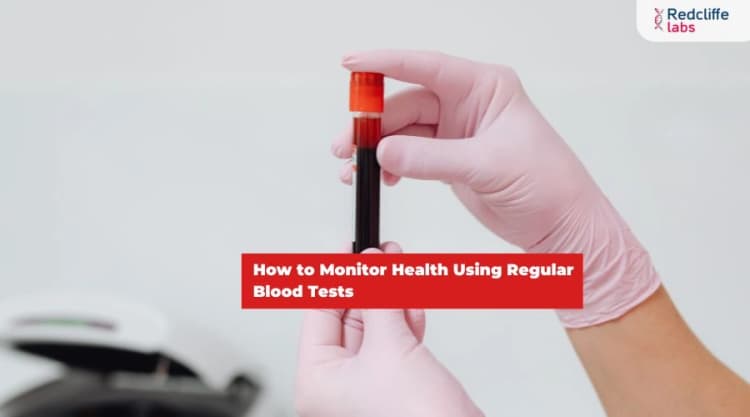The Progesterone Test is a vital blood test that mea...Read more
Blood
Unlock special
discount on
this package
Login to Unlock 🔓
Also Known As
P4 test, PGSN testNABL Accredited lab*

Booking Benefits Unlocked Worth FREE 799

Report Consultation

Diet Plan
*Available once your report is generated.
At Redcliffe Labs, we have a single goal: to give India its right to quality diagnostics.
Customers served
Tests Processed Everyday
Cities
Collection Centres
World Class In-house Labs
Home Collection Experts
1 Test Parameters
Progesterone
1 PARAMETER INCLUDED
1 PARAMETER INCLUDED
- Progesterone (steroid hormone)
Helps you know your test better
Who all are eligible for this test?
- This is a hormone made by the ovaries and helps in pregnancy in many ways.
- helps to support the fertilized egg inside the uterus.
- Women with a risk of pregnancy complications, abdominal cramps, bleeding, or miscarriage.
- Women are showing the symptoms of menopause due to hormonal imbalance.
Why take progesterone test?
- A doctor may suggest this test if a woman is facing trouble getting pregnant..
- It manages and diagnoses potential infertility problems.
- The test also predicts the risk of miscarriage after getting pregnant.
- This is a helpful test in infertility assessment as well.
What are the benefits of taking progesterone test ?
- This test enables doctors to monitor a high-risk pregnancy.
- It helps in the diagnosis of ectopic pregnancy during IVF treatment.
- It tells the status and the functions of ovaries.
- It detects any cysts or tumors in the ovaries.
- helps doctors analyze and plan the proper treatment for infertility.
Top Booked Health Checkup Packages
Reports in 12 hours
|Parameters 94
Reports in 12 hours
|Parameters 89
Reports in 12 hours
|Parameters 96
Reports in 12 hours
|Parameters 96
Reports in 12 hours
|Parameters 90
Helps you know your test better
Q. How can I book my test?
Q. In how much time will I get my test report?
Q. Where can I see or get my test results?
Q. Is home sample collection available for this test?
Verified by Medical Expert

WRITTEN BY
Sheena Mehta

MEDICALLY REVIEWED BY
Dr. Pradeep Lodha
Table of Content
Introduction to Progesterone Test
A progesterone test is usually ordered to check the progesterone level in a blood sample. Progesterone is a hormone that ovaries make. It prepares a woman's uterus for pregnancy. Besides, it also triggers a woman’s breast to produce milk during pregnancy.
Progesterone is also important during menstruation. During this period, an ovary releases an egg, and progesterone levels rise. Additionally, progesterone makes the uterus lining thick, which helps a fertilized egg grow into an embryo and a fetus.
If you are not pregnant, your progesterone levels will fall. On the contrary, if you are pregnant, these progesterone levels will continue to rise ten times higher than usual for a healthy pregnancy.
A progesterone test is a part of routine pregnancy monitoring that helps prepare your body for pregnancy. A doctor usually suggests the progesterone test to determine whether or not you have ovulated. Besides, it checks for the cause of abnormal uterine bleeding in case you are not pregnant.
If your doctor has suggested a progesterone test to evaluate fertility issues or monitor pregnancy health, get yourself tested today. You can book a progesterone test from Redcliffe Labs with a home sample collection convenience. The accurate testing, affordable pricing, and efficient services make them stand out.
So, why wait? Get your test done from Healthy India ki Trusted Lab, Redcliffe Labs. So that you know – the rest is fully assured.
Test Details
| Also known as | Serum progesterone, progesterone blood test, PGSN |
| Purpose | It measures progesterone levels, assesses risks for miscarriage & detects problems with conceiving. |
| Preparation | Do not drink or smoke before the test. |
| Fasting | No Fasting Required |
| Sample type | Blood |
| Available for | Both males and females |
| Get reports within | 18 hours |
| Cost Offered | INR 599 |
What are the common symptoms associated with a progesterone test?
Symptoms associated with low progesterone test are:
- Mood swings
- Depression
- Anxiety
- Headache
- Abdominal pain
- Dryness in the vaginal area
- Spotting between periods
Symptoms associated with a high progesterone test are:
- Premenstrual symptoms, or PMS.
- Bloating
- Anxiety
- Reduced libido
- Acne
- Weight gain
- Depression
What is the purpose of a progesterone test?
Progesterone is a hormone that prepares a woman for pregnancy. This test measures the level of progesterone in the blood.
The progesterone test is used in several circumstances, including:
- Evaluate fertility issues: One of the main purposes of a progesterone test is to determine whether ovulation is occurring.
- Monitor pregnancy health: Progesterone also supports the uterus lining during the initial pregnancy.
- Investigate menstrual disorders: The test also helps diagnose causes of irregular or missed periods.
- Assess the risk of miscarriage: Low progesterone levels in the initial stage of pregnancy may indicate a risk of miscarriage.
- Check for ectopic pregnancy: A progesterone test also helps check for ectopic pregnancy. This is a condition in which a fertilized egg tries to grow outside the uterus. Hence, it needs to be removed to avoid damage to your organs.
- Checks the health of pregnancy: A progesterone test in high-risk pregnancy can help prevent an early birth.
- Diagnose ovarian cancer: The test also helps diagnose ovarian cancer or problems with your adrenal glands. High progesterone levels by adrenal glands may indicate an adrenal disorder in both males and females.
- Monitor treatment involving progesterone: A progesterone test is also performed to monitor hormone therapy or IVF treatments.
No matter the reason, if your doctor has suggested a progesterone test based on your symptoms, do not delay. Get a progesterone test done now!
Why do you need a progesterone test?
You may need a progesterone test for the following reasons:
- Trouble getting pregnant: You may need the test if you have trouble. Through this test, it will be clear whether your ovaries are releasing eggs.
- Monitors fertility treatment: You may need a progesterone test if you are undergoing a fertility treatment. Your doctor will monitor your progesterone levels to confirm if ovulation has occurred.
- Suffered a miscarriage, stillbirth, or unusual bleeding: A healthcare provider may also check your progesterone in this condition to support a healthy pregnancy.
- Pregnancy complications: Your healthcare provider may also suggest a test to check if you have a higher risk of miscarriage or other pregnancy complications.
Note: High or low progesterone levels may be a sign of various conditions, including ovarian cysts, adrenal gland disorders, or pregnancy issues. Additionally, for men, a progesterone test helps detect adrenal or testicular tumors.
How can you prepare for the progesterone test?
No preparation is required for a serum progesterone test. It is a simple blood test; however, keeping a few instructions in mind will surely help.
- Inform your doctor if you are taking any over-the-counter medications. Progesterone supplements and birth control pills can affect the test results. Besides, there are blood thinners that can also increase the risk of complications. Consequently, your doctor may ask you to avoid certain medications before the test.
- Fasting is not required for a progesterone test. Your doctor may suggest taking the empty stomach test based on your health condition. This also helps improve the accuracy of your test results.
- Do not engage yourself in strenuous exercises. This may lead to hormone fluctuations and thus hamper the accuracy of progesterone testing.
Note: An open discussion with your healthcare provider is a must before you get your blood drawn.
What is the procedure for the test?
A progesterone test is a simple blood test and won’t take more than five minutes. A small amount of blood is taken, typically from a vein in the arm. The collected blood is sent to the laboratory for diagnosis.
Our phlebotomist will carry a home sample collection kit and reach your home anytime. He has a field of expertise that ensures painless blood draw.
There might be a slight pain or bruise on the needle spot, but these symptoms will disappear quickly.
Other progesterone-related tests include:
Your doctor may also order additional tests along with a progesterone test:
- Blood tests
- A specific blood test to detect complications in pregnancy.
- Urine test.
- Ultrasound
Note: Redcliffe Labs is dedicated to offering state-of-the-art diagnostic services, including home blood and urine collection, which is convenient for patients who prefer or require tests to be done at home. Also, progesterone test reports are typically available within 18 hours. So, why wait? Book now!
What do the progesterone test results indicate?
A progesterone test measures the level of progesterone in the blood. Progesterone is a hormone that plays a vital role in menstruation, pregnancy, and overall reproductive health.
Here is what a progesterone test report could indicate:
Normal Results:
The normal results for serum progesterone test fall in the following ranges:
- When the menstrual cycle starts: 0.89 ng/mL or under
- In the middle of the menstrual cycle: 1.8–24 ng/mL
- During the first three months of pregnancy: 11–44 ng/mL
- During the middle part of your pregnancy: 25–83 ng/mL
- During the final three months of pregnancy: 58–214 ng/mL
- After menopause: 0.2 ng/mL or under
Disclaimer: Normal reference ranges for progesterone may vary slightly depending on the laboratory and individual risk factors and cycle.
For women:
- Follicular phase. It is before ovulation when the progesterone levels are typically less than one ng/mL. This stage indicates that the body is not preparing for pregnancy.
- Luteal phase. It is after ovulation. It is the stage where progesterone prepares the uterus for pregnancy. High levels in this phase indicate successful ovulation.
- During pregnancy. Progesterone levels continue to rise and fall between 10 and 90 ng/mL, depending on your pregnancy stage.
- After menopause, progesterone levels remain low. They are usually less than 1 ng/mL because the ovaries produce less progesterone.
For men:
Men produce around 0.1 to 1 ng/mL levels of testosterone. The high levels of progesterone in men might be a sign of serious health concerns such as adrenal gland disorders or testicular cancer.
Abnormal levels:
The abnormal test report means low or high progesterone levels.
- Low progesterone levels may suggest ovulation, which can affect fertility. Besides, low levels could indicate a potential miscarriage or ectopic pregnancy.
- High progesterone levels could suggest pregnancy. In non-pregnant women, high levels might indicate ovarian cysts, molar pregnancy, or adrenal gland issues.
What if the progesterone blood test reports are positive?
Suppose your progesterone blood test reports are positive, which means elevated levels. This can indicate several things depending on the individual and the situation:
- Ovulation: the elevated progesterone levels in the middle of the menstruation cycle indicate that ovulation has occurred.
- Pregnancy: In the initial stage of pregnancy, pregnancy levels remain high. Hence, they support the development of the uterine lining and maintain pregnancy. A positive progesterone test could suggest the occurrence of implantation and the pregnancy's progression.
- Hormonal treatments: In this condition, a positive progesterone test report might indicate that the fertility treatments are working.
- Menstrual irregularities: for individuals with irregular periods, a positive progesterone test would suggest ovulation, while low levels may indicate an issue with ovarian function.
- Hormonal Imbalances High progesterone levels could indicate a hormonal imbalance or an issue like ovarian cysts, although this is less common.
What are the factors affecting progesterone levels?
Below are the factors that can affect progesterone levels:
- Age is the first and foremost factor that can affect progesterone level. Pre-menopausal women undergo cyclical changes in progesterone, with higher levels during the luteal phase of the menstrual cycle.
In postmenopausal women, progesterone levels are low. It is due to a decline in ovarian function.
- Menstrual Period: Progesterone levels rise after the luteal phase. They fall if you are not pregnant, leading to menstruation.
- Pregnancy: During pregnancy, progesterone levels increase significantly. This is to support the lining of the uterus and the initial stages of pregnancy. The placenta (uterus) produces progesterone after three months of pregnancy, further boosting levels.
- Ovarian Function: It includes two conditions: polycystic ovary syndrome (PCOS) and ovarian failure.
- In polycystic ovary syndrome (PCOS), lower progesterone levels can occur due to impaired ovulation.
- In ovulation failure, ovaries do not release eggs properly. This can result in low progesterone levels.
- Too much stress is another factor that can suppress progesterone levels by increasing cortisol production.
- Nutrition deficiencies: It is essential to eat a balanced diet. Nutritional deficiencies may negatively impact progesterone production. Besides, highly processed foods or refined sugar can cause hormonal fluctuations.
- Hypothyroidism can certainly affect progesterone levels. Proper thyroid function is necessary for ovulation.
- Medications such as hormonal birth control or fertility drugs can influence progesterone levels. Either they suppress or increase them depending on the type of drug.
- Too much exercise: Engage yourself in moderate exercise as it helps maintain hormonal balance and also supports healthy progesterone production. Too much exercise can disrupt menstrual cycles and result in lower progesterone levels by affecting ovulation.
- Body Fat Percentage: Low body fat is not good. It can interfere with ovulation and lead to insufficient progesterone production.
On the other hand, too much weight gain or obesity can disturb your hormonal balance.
What are the risk factors associated with a progesterone test?
Generally, a progesterone blood test is safe. As the test involves blood draw, there could be a slight pain or discomfort in your arm. These are normal symptoms that will disappear on their own.
Besides slight discomfort, feeling dizzy and faint during and after the blood test is also normal for some people. If you have experienced this in the past, do inform the person carrying out the test so he is aware, which can make you feel more comfortable.
Furthermore, if symptoms don’t disappear in two or three days or excessive bleeding, seek medical assistance immediately.
Book a progesterone test from Redcliffe Labs for INR 599 only!
If your healthcare provider has suggested a progesterone test, you need not delay. The progesterone test price at Redcliffe Labs is INR 599 only. Download the Redcliffe Labs app and book the progesterone blood test online.
We also offer express booking slots, which allows progesterone test blood sample collection within 45 minutes from your home.

Progesterone Test Cost in Different Cities - Redcliffe Labs
| City Name | Discounted Price |
| Delhi | ₹599 |
| Ahmedabad | ₹599 |
| Mumbai | ₹599 |
| Bangalore | ₹599 |
| Noida | ₹599 |
| Pune | ₹599 |
| Lucknow | ₹599 |
| Hyderabad | ₹599 |
| Chennai | ₹599 |
| Gurgaon | ₹599 |
| Jaipur | ₹599 |
| Faridabad | ₹599 |
| Indore | ₹599 |
| Patna | ₹599 |
Note: We also offer Progesterone Test PAN India. Please call the number 8988988787 to check the availability of our services in your area.
Step-by-step instructions to book a progesterone test online from Redcliffe Labs:
- Go to the Redcliffe Labs website.
- Search for the "progesterone test."
- Click on the progesterone test. You will see details, including the test price.
- Follow the prompts to book your test.
- Complete the payment process.
Note: After booking, you will receive a confirmation via SMS and WhatsApp.
Conclusion
Progesterone is a vital hormone during pregnancy. Ask your healthcare provider what your test results mean to help understand the possible reasons for abnormally high or low progesterone levels.
Your doctor may also order additional tests and suggest treatment plans that pave the way for the best outcomes.
5 Simple Steps to Manage Your Health with Redcliffe Labs
Quick, Simple & Convenient; trusted care delivered to your doorstep.

Start Your Online Booking
Open the Redcliffe Labs website/app. Select the test or package and enter your details. Schedule the service for your preferred slot.

Live Tracking
Stay updated with real-time tracking for a smooth and timely home sample collection.

Sample Collection
Our certified experts ensure a smooth, hygienic, and fully compliant sample collection experience.

Doctor-Verified Smart Reports
Every report is clinically checked by expert doctors and shared with smart, actionable insights.

Your Health Journey Continues Post Reports
Consult with our expert medical team to get actionable insights to improve your health.
Nearby Labs(9)
Redcliffe Labs Noida

MC-5280
Redcliffe Collection Center
Redcliffe Collection Center
Redcliffe Collection Center
Redcliffe Collection Center
Redcliffe Collection Center
Redcliffe Collection Center
Redcliffe Collection Center
Redcliffe Collection Center
Frequently Asked Questions
What is a progesterone test, and why is it done?
How is the progesterone test performed?
When should I get a progesterone test?
What do high or low progesterone levels mean?
Can a progesterone test indicate pregnancy?
How do progesterone levels change during the menstrual cycle?
Do I need to fast before taking a progesterone test?
What conditions can affect progesterone levels?
How long does it take to get the results of a progesterone test?
Can medications affect my progesterone test results?
Can I book a Progesterone Test near me?
Can I book a home collection for a Progesterone Test?
Health Articles & Blogs
My Health
Stay informed with our expert health articles and blogs. Explore comprehensive guides on diseases, nutrition, preventive care, and wellness tips to help you make better health decisions.
Capsicum (Shimla Mirch) 101: Benefits, Nutritional Value, Uses and More

Normal Calcium Levels: Range, Symptoms & Causes of Imbalance

Home Remedies to Get Rid of Cold in Babies: Safe & Natural Relief for Infants
Discover safe home remedies to get rid of cold in babies. Learn natural and gentle relief methods to ease cough, congestion, and cold symptoms in infants.

How Often Should You Get a Full Body Health Checkup?

Understanding BUN Test Normal Range & Results: High, Low & Normal
Understanding BUN test normal range and results helps evaluate kidney health. Learn what high, low, and normal BUN levels mean and when to get tested.

What Level of Lymphocytes Is Dangerous?

How to Monitor Health Using Regular Blood Tests?

টাইফয়েড কি বাহিত রোগ? – জানুন সবকিছু
Explore My Health
